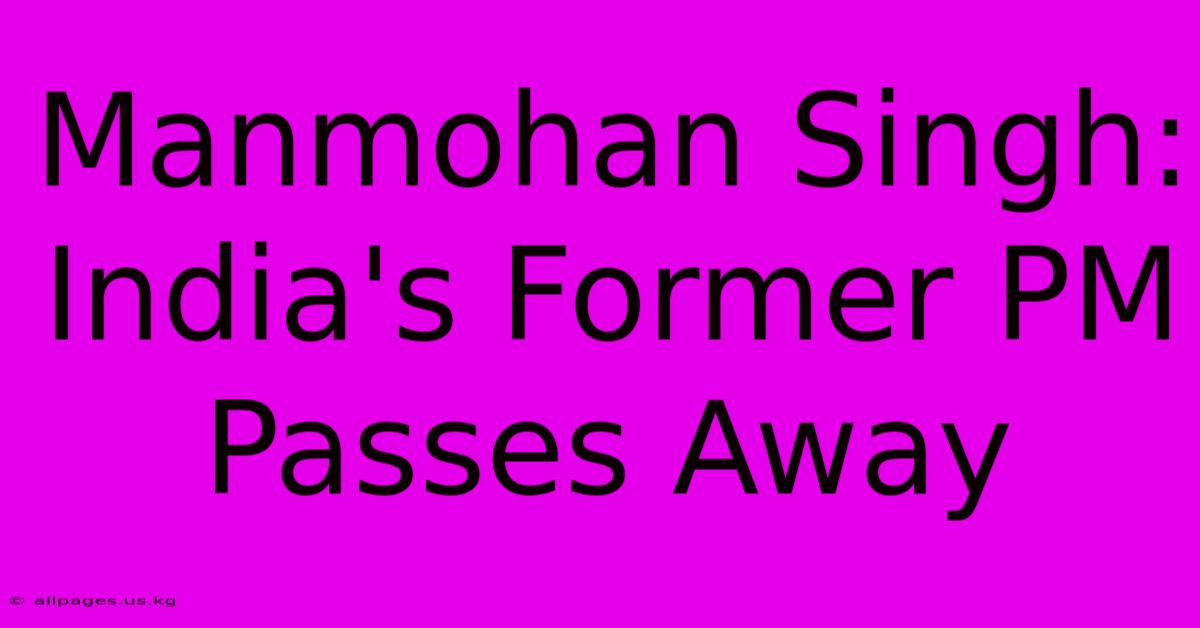Manmohan Singh: India's Former PM Passes Away

Discover more detailed and exciting information on our website. Click the link below to start your adventure: Visit Best Website allpages.us.kg. Don't miss out!
Table of Contents
Manmohan Singh: India's Former Prime Minister Passes Away - A Nation Mourns
The nation is in mourning following the passing of former Prime Minister Dr. Manmohan Singh. His death marks the end of an era in Indian politics, leaving behind a legacy both celebrated and debated. This article will explore the life and times of this remarkable figure, examining his contributions to India and the impact of his tenure as Prime Minister.
A Life Dedicated to Service
Born in 1932 in Punjab, Dr. Manmohan Singh's journey was one of remarkable achievement. His academic brilliance led him to a distinguished career as an economist, earning him global recognition before entering the political arena. His expertise in economics shaped his approach to governance, leaving an indelible mark on India's economic landscape.
Early Life and Career: Before his political career, Dr. Singh served as the Governor of the Reserve Bank of India and held key positions in various international financial institutions. This experience provided him with a deep understanding of economic policy and global finance, crucial for his future role as Prime Minister.
Economic Reforms: His profound understanding of economics played a crucial role in shaping India's economic policies. He is widely credited with the liberalization of the Indian economy in the 1990s, a period often referred to as the "Indian Economic Reforms". These reforms opened up India to global trade and investment, fostering significant economic growth. This period saw a dramatic shift in India's economic trajectory, transforming it into a major player on the global stage.
Ten Years as Prime Minister (2004-2014)
Dr. Singh served as Prime Minister for two consecutive terms, from 2004 to 2014. His tenure was characterized by a focus on economic development and social justice. While his government achieved significant economic progress, it also faced criticism for its handling of certain policy issues and corruption allegations.
Achievements During His Premiership: Some notable achievements during his tenure include:
- Significant economic growth: India witnessed considerable economic expansion during his time in office.
- Infrastructure development: Major investments were made in infrastructure projects across the country.
- Social programs: Several social welfare programs were initiated to address poverty and inequality.
Criticisms and Challenges: Despite his achievements, Dr. Singh's government faced numerous challenges, including:
- Corruption scandals: Several high-profile corruption cases tarnished the image of his administration.
- Slow pace of reforms: Critics argued that the pace of economic reforms slowed down during his second term.
- Inequality: Despite economic growth, concerns remained regarding the widening gap between the rich and the poor.
A Legacy of Debate
Dr. Manmohan Singh's legacy is complex and multifaceted. While he is widely lauded for his role in India's economic liberalization, his tenure as Prime Minister also faced its share of criticism. His quiet demeanor and intellectual approach often contrasted with the more assertive styles of other political leaders. His legacy will continue to be debated and analyzed by historians and economists for years to come.
Remembering a Statesman
Dr. Manmohan Singh's passing marks the end of an era. He was more than just a Prime Minister; he was a respected economist, a dedicated public servant, and a symbol of India's intellectual prowess. His contributions to India's economic development and his commitment to public service will be long remembered. The nation mourns the loss of a true statesman. His life and legacy serve as a testament to the power of dedication, intellect, and unwavering commitment to one's nation. His death is a profound loss, not just for India, but for the global community.
Keywords: Manmohan Singh, Former Prime Minister, India, death, obituary, legacy, economic reforms, Indian economy, politics, statesman, Reserve Bank of India, liberalization, economic growth, social justice, corruption, achievements, challenges, contributions.

Thank you for visiting our website wich cover about Manmohan Singh: India's Former PM Passes Away. We hope the information provided has been useful to you. Feel free to contact us if you have any questions or need further assistance. See you next time and dont miss to bookmark.
Featured Posts
-
Reds Beat Leicester 3 1 Salahs Goal
Dec 27, 2024
-
Wordle Today 1287 Hints And Answer
Dec 27, 2024
-
New China Fighter Jet Videos
Dec 27, 2024
-
Live Score Rutgers Vs Kansas State Game
Dec 27, 2024
-
Pittsburgh Vs Toledo 2024 Prediction
Dec 27, 2024
